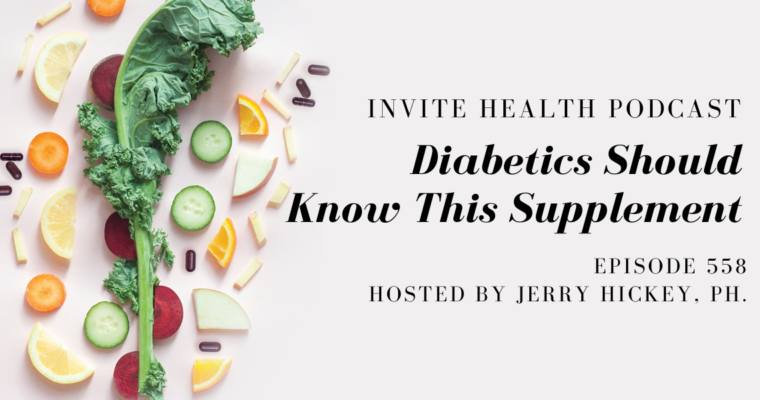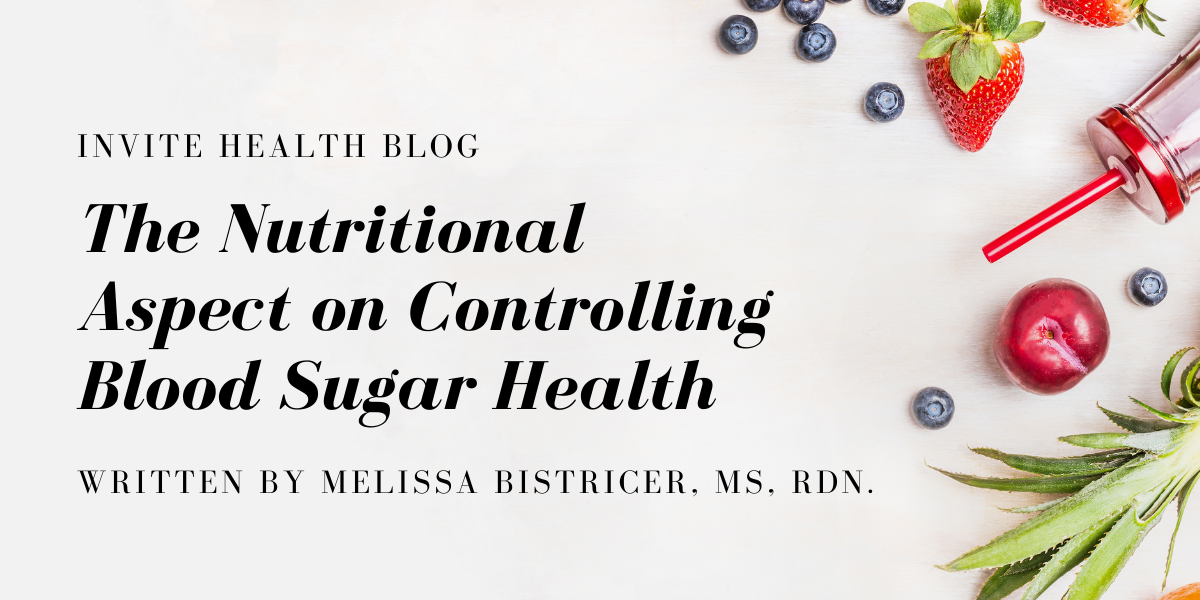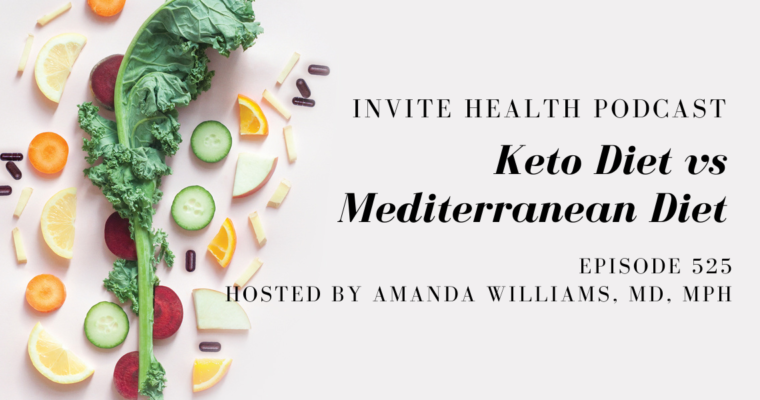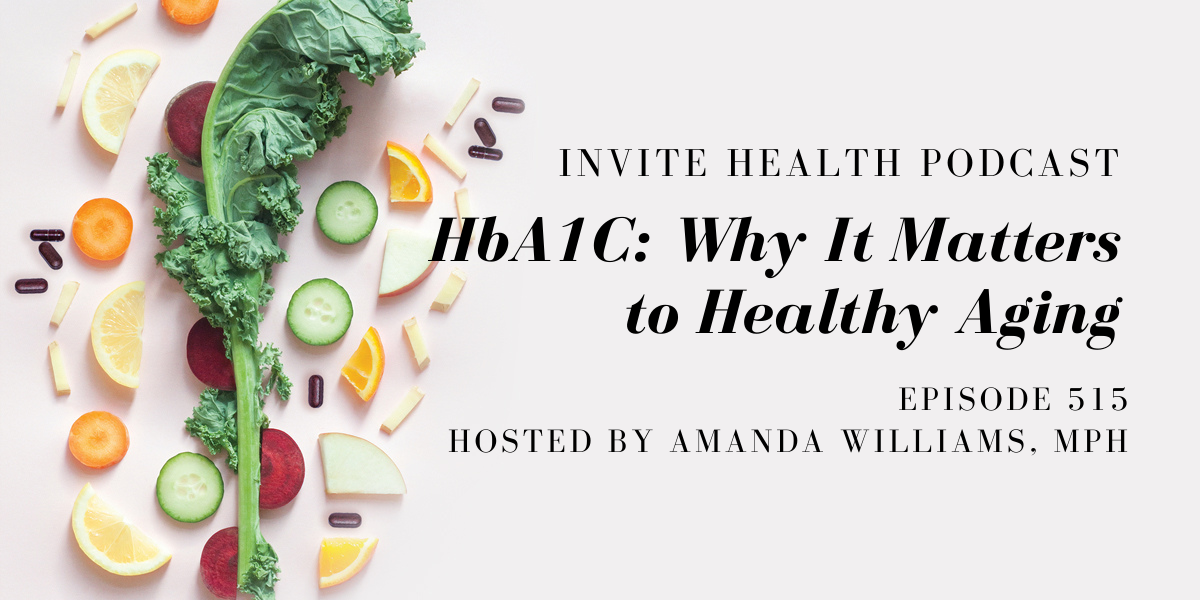HbA1C HbA1C HbA1C HbA1C HbA1C HbA1C HbA1C HbA1C HbA1C HbA1C HbA1C HbA1C HbA1C
Subscribe Today!
Please see below for a complete transcript of this episode.
HbA1C: Why It Matters to Healthy Aging – InViteⓇ Health Podcast, Episode 515
Hosted by Amanda Williams, MPH
*Intro music*
InViteⓇ Health Podcast Intro: Welcome to the InViteⓇ Health Podcast, where our degreed healthcare professionals are excited to offer you the most important health and wellness information you need to make informed choices about your health. You can learn more about the products discussed in each of these episodes and all that InViteⓇ Health has to offer at www.invitehealth.com/podcast. First time customers can use promo code PODCAST at checkout for an additional 15% off your first purchase. Let’s get started!
*Intro music*
Amanda Williams, MPH:
[00:00:40] Why you should test your Hemoglobin A1C level on an annual basis is really important. Oftentimes, when we think about HbA1c, we think in the setting of diabetes. And of course, this is the key indicator for the measuring and monitoring of diabetics. But it’s also very important that we know if we are prediabetic or if our Hemoglobin A1C level is in a good and healthy range. So today I want to talk about what exactly HbA1c is and some different nutrients that can be very beneficial when it comes to targeting glycation.† [00:01:10]
[00:01:11] I’m Amanda Williams, MD, MPH and Hemoglobin A1C is a marker that we assess when it comes to the management of your blood sugar and Hemoglobin A1C is basically measuring the amount of blood sugar that’s attached to hemoglobin. And when we think about glycation, I’ve mentioned this on many different shows and podcasts before, why glycation and advanced glycation end products are so detrimental. So we know that every time that we eat, we are going to get a rise in blood sugar, blood glucose. And this is irrelevant if someone’s a diabetic or not a diabetic, your blood sugar is going to go up. What happens is that if we get this rise in advanced glycation end products, this can do significant damage. So when you understand that these glycation products actually hook on to things such as proteins, and we’re thinking hemoglobin, which is a protein, and this is an indication that damage is being done at the level of our red blood cell. We’re thinking about Hemoglobin A1C. What we know about advanced glycation end products is that they deactivate enzymes, they disrupt cell signaling pathways. They certainly can damage our cellular DNA. They can drive up inflammation and oxidative stress, all of things that are incredibly problematic for our body.† [00:02:37]
CHRONIC INFLAMMATION, PART 1 – INVITE HEALTH PODCAST, EPISODE 498. Listen Now>>
[00:02:38] So we think about Hemoglobin A1C. What we’re actually looking for is the rate of glycation, those advanced glycation end products that are actually attaching to your red blood cell. Now, understanding that red blood cells have a lifespan of 120 days. So when you assess Hemoglobin A1C, this is exactly what we’re looking at. We’re looking at the rate of glycation that occurs over the course of that three months, which is why it’s a much better test to run than, say, if you were to just test your fasting glucose. Fasting glucose is a snapshot in time, it’s telling you what’s happening right now, but it doesn’t give us a clear indication of how much of that elevated glucose is actually going to convert into those advanced glycation end products and wreak havoc when it comes to our hemoglobin. So when assessing for prediabetes and diabetes, Hemoglobin A1C is always the go to. If that level is high, that indicates that there is a high level of glycation that is occurring. And this is problematic not just because it shows that we’ve got significant insulin resistance and the body is having a hard time managing glucose. But we know that this is going to impact every other organ system in the body. So when you think about your heart, when you think about your kidneys, when you think about the nervous system, we know that those AGEs, as they are known, will create a lot of bad things for us.† [00:04:02]
[00:04:03] Now, when you look at the rates or the levels, I should say, what those actually mean. So say you go in and you have a Hemoglobin A1C test done. What you’re looking for, ideally according to most labs, is a Hemoglobin A1C level at 5.7 or below. I look at that to be even lower. I think it should be 5.5 or lower. You’re considered a prediabetic when your hemoglobin A1C level is coming back at 5.7 To 6.4. Now, once you reach a Hemoglobin A1C level that is above a 6.5, now you are categorized or diagnosed as being a diabetic. Now I have seen Hemoglobin A1C levels in the teens, 15, 16 20, and that is incredibly alarming if you see a level that high because you now recognize that that glycation has gone well outside of just your hemoglobin and this is now likely to be hitting up your nervous system in a significant manner. You know, really creating havoc within your vascular system. So the evaluation of Hemoglobin A1C in terms of long term blood sugar control is one of the most important things that we can assess, not only in the setting of just blood glucose regulation, but when we think about our aging process. And I always say we want to age gracefully if we’re walking around with high levels of advanced glycation end products that are damaging certain areas of the body, we need to be aware of this so we can make corrections to our lifestyle when it comes to diet, when it comes to exercise and obviously when it comes to the nutrients that you are taking in.† [00:05:39]

[00:05:39] So Hemoglobin A1C, commonly tested in diabetics, we know that, you know, if you go in to your doctor, they’re not just going to generally run a Hemoglobin A1C unless they have a suspicion that you are a diabetic. The problem is, is that we know there are so many prediabetics in this country. At the last estimate, it was around 80 million people who are actually prediabetic, meaning that that Hemoglobin A1C level is testing back at 5.7 to 6.4. That’s a problem because if you, say you’re wavering at 5.6, you need to be making those corrections. You don’t want to wait until the level of glycation damage is such that you are now technically a prediabetic or a full blown diabetic. So it’s very important. This is why when doctors assess Hemoglobin A1C, they always say this gives us an look at how well your average blood sugar levels have been running over the course of the past two to three months. Because remember, what we’re looking at is that life span of a red blood cell. So in general, that’s kind of the way that it is looked at. Remember, hemoglobin is a protein, and we know that those advanced glycation end products love to attach to proteins. So this is why this is a very accurate test to do.† [00:06:52]
[00:06:53] So say, for example, your hemoglobin A1C is not technically putting you at a prediabetic or a diabetic, but it’s still higher than you would like to see. So maybe you’re at 5.6, then what should you be doing? Or let’s just say you’re in that prediabetic range or even the diabetic range? What should you be doing? Well, we want to make sure that we’re taking nutrients that we know are very geared towards targeting advanced glycation end products with the regulation of blood glucose and enhancing the insulin sensitivity. So this is where Nerve HxⓇ becomes your new best friend because this is a fat-soluble form of Vitamin B1. And what’s really unique about this fat-soluble B1? So remember, all of our B-vitamins are water-soluble, so this is very unique in and of itself that it is of a fat-soluble variety. But we know that it does something really important, which is the activation of an enzyme called transketolase. Now, transketolase helps our body convert these toxic glucose metabolites into harmless or neutral compounds so that the body can then manage them so they’re not converting into these AGEs or advanced glycation end products. So this is why Nerve HxⓇ containing the benfotiamine is certainly one of the little weapons in your arsenal.† [00:08:10]
CHRONIC INFLAMMATION, PART 1 – INVITE HEALTH PODCAST, EPISODE 498. Listen Now>>
[00:08:11] But I would also look towards other nutrients that we know are incredibly beneficial when it comes to targeting AGEs or glycation in the body. And that would include things such as Alcar with ALA. We certainly understand the important multimodal functions of alpha lipoic acid in the body, and when it comes to the way that alpha lipoic acid can help the body with that regulation of those glycation and products. So Nerve HxⓇ is a first and foremost, then we also want to look at Alcar with ALA. We want to make sure that we are changing our diet, that we are not creating these major spikes in blood sugar. So adherence to a Mediterranean diet is certainly important. Getting adequate exercise, even if it’s, you know, 20, 30 minutes a day of just light walking can make an impact on how your body is managing your blood glucose. So this is also key.† [00:09:05]
[00:09:05] And then we can look at formulations such as the Gluco HxⓇ, which you would take about 15 minutes prior to meals. This is a combination of key minerals, trace minerals such as chromium and vanadium that help to wake up your insulin, along with extracts such as bitter melon, which have been shown in human clinical trials to be incredibly powerful at promoting the wakefulness of our insulin. And this is always important. We want to make sure that insulin can respond to those big increases in glucose, so it helps to push that down, so we are less likely to allow our body to make those advanced glycation end products. So Hemoglobin A1C certainly is a test that would be advantageous to request your doctor to to run, even if you don’t have those concerns of being a diabetic or prediabetic. It certainly can give you a lot of insight as to how while your body is managing those advanced glycation and products and it gives you that open door to be able to make those modifications based off of where that level is. So definitely next time you go in and you have your blood work done, check out Hemoglobin A1C, make sure that you test that. If you have issues, you know the nutrients that you can turn to to give you some additional support.† [00:10:17]
[00:10:18] I want to thank you so much for tuning in to the InViteⓇ Health Podcast. Remember, you can listen to all of our episodes for free wherever you listen to podcasts, make sure that you subscribe and leave us a review. You can follow us on Facebook, Twitter and Instagram. We will see you next time for another episode of the InViteⓇ Health Podcast.† [00:10:18]
*Exit music*












